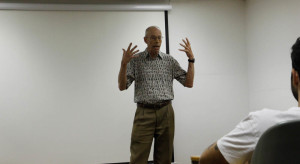Tags
Related Posts
Share This
What is 920?
The room wasn’t full of drug crazed maniacs but, instead, an attentive crowd showed up Sept. 18 to learn more about the 920 Coalition, a group dedicated to researching the role of psychedelic psilocybin mushrooms in our society and health care system. 920 paired together with SSDP, an organization of students working to end the war on drugs and their harmful nature in the community, to host the event.
Psilocybin mushrooms, also known as psychedelic mushrooms, are mushrooms that contain the psychedelic compounds psilocybin and psilocin. They are a recreational drug that when ingested can cause a number of effects, including altered consciousness, altered state of time, euphoria and hallucinations. While this may sound great to some, the main reason why the 920 Coalition came about is if the drug is taken in excess or in the wrong environment, it can cause adverse effects like extreme paranoia and lack of self. The 920 Coalition, with the support of the Students for Sensible Drug Policy hosted the event at SFUAD in order to educate students, not to advocate the use.
“Education is the key that unlocks the door of understanding,” said Film student Julian Fox, who helped coordinate the event.
Fox stumbled across the 920 Coalition when listening to the Duncan Trussell Family Hour podcast. A supporter of the medical uses of psilocybin mushrooms, Fox contacted the organization and was met with full support.
After Fox’s intro, the bulk of the information came from guest speaker George Greer MD, co-founder and medical director of the Heffter Research Institute, located in Santa Fe. Though it was his first time speaking on the behalf of the coalition, Greer has been managing for 23 years research projects at medical schools, including extensive research in the medical purposes of psilocybin mushrooms. Heffter is involved in basic science that entails studying how psychedelics affect the mind and brain, as well as clinical science, which is the actual treatment of patients with various problems. Patients are given a high dosage, up to 30 mg, to experience the peak of the drug. This is done weekly or monthly depending on the strength of the dose and needs of the patient. They sit in a room very similar to a cozy living room with a male and female therapist, to help with safety and the occasional trip to the bathroom.
At the University of New Mexico, according to Greer, the first case studies of psilocybin for alcoholism are taking place,—the first time any research like this has been done since the 1970s. They found that the hundred or so patients’ drinking was nearly cut in half. But more research continues to really show the long terms effects of the drug and the disease. Either way, with the high rate of alcoholism in the state of New Mexico, this research could be a very promising alternative to solve the problem.
John Hopkins School of Medicine is conducting similar research as it relates to smoking addiction and the findings so far have been tremendous. After patients were subjected to just a few treatment sessions, smoking was nil to none.
It is also important to note that the benefits last for months and follow up interviews are done for each case study.
When Jackalope asked about the thin line between education and advocation, Greer said, “A lot of people use them (psilocybin mushrooms) in a serious way for personal growth and a lot them get benefits from that, but there are some people who have unpleasant or harmful experiences also. So at the Heffter Institute we don’t advocate anything. We’re purely a scientific research organization. We are trying to find and promote and scientifically demonstrate medical uses for psychedelic mushrooms.”
He went on to say, “We’re finding in our research that psychedelics can be very helpful for people with emotional distress from having cancer, alcoholism, smoking, P.T.S.D., when used safely, but it doesn’t really say anything about how safe these medicines are for uncontrolled use.
Hannah Kashen was among those in the audience, she said after the presentation, “I thought that we were a lot further than 10 years of getting [Food and Drug Administration] approval; it’s really amazing.”
Jordan Solice, a Contemporary Music Major said, “I thought this would be largely disapproved of by the medical community, and I was surprised to find that people had devoted considerate amount of time and resources to it.”
Heffter is finishing its second and third study with patients, and the findings will be published soon. Greer says the next step is working with the FDA so that psilocybin can become an approved drug on the list for those patients in need of the treatment.
“We’re very optimistic that in the next several years that the FDA will approve psilocybin under highly controlled conditions.” said Greer
The 920 Coalition, along with findings from The Heffter Research Institute and pro active students like Fox, are working to educate the public on the fact that these type of drugs do have a positive aspect to them besides making your friends laugh uncontrollable and claim they talked with the trees. There are very exciting findings backing the use of these drugs for medical purposes. Whether this information will make an impact is yet to be seen.







 Jackalope Magazine is the student magazine of Santa Fe University of Art and Design. Building on the interdisciplinary nature of our education, we aim to showcase the talent of our university and character of our city.
Jackalope Magazine is the student magazine of Santa Fe University of Art and Design. Building on the interdisciplinary nature of our education, we aim to showcase the talent of our university and character of our city.
Recent Comments